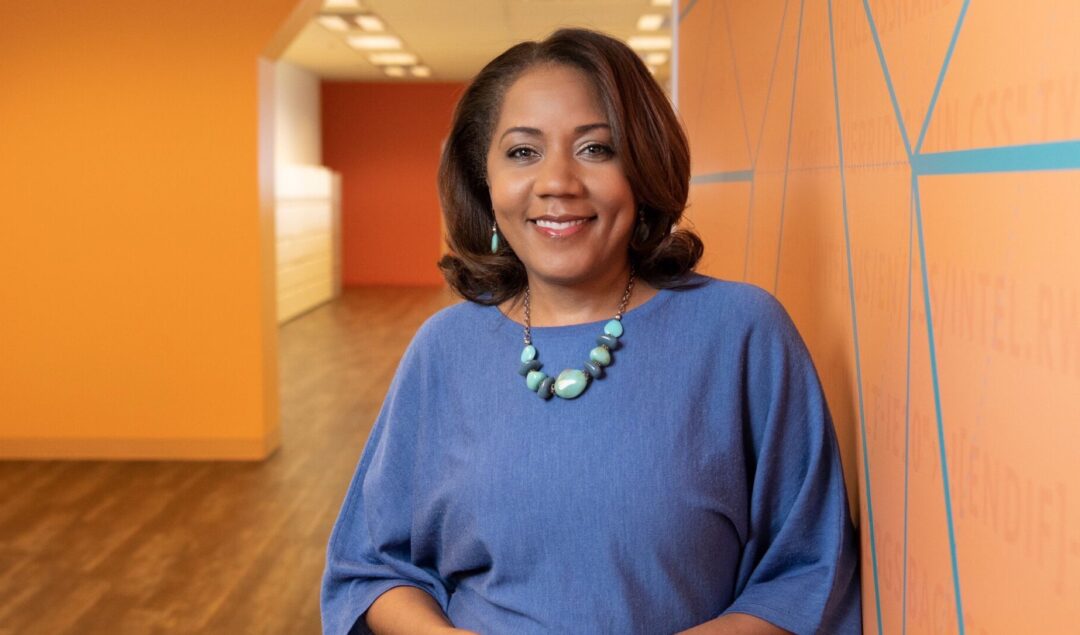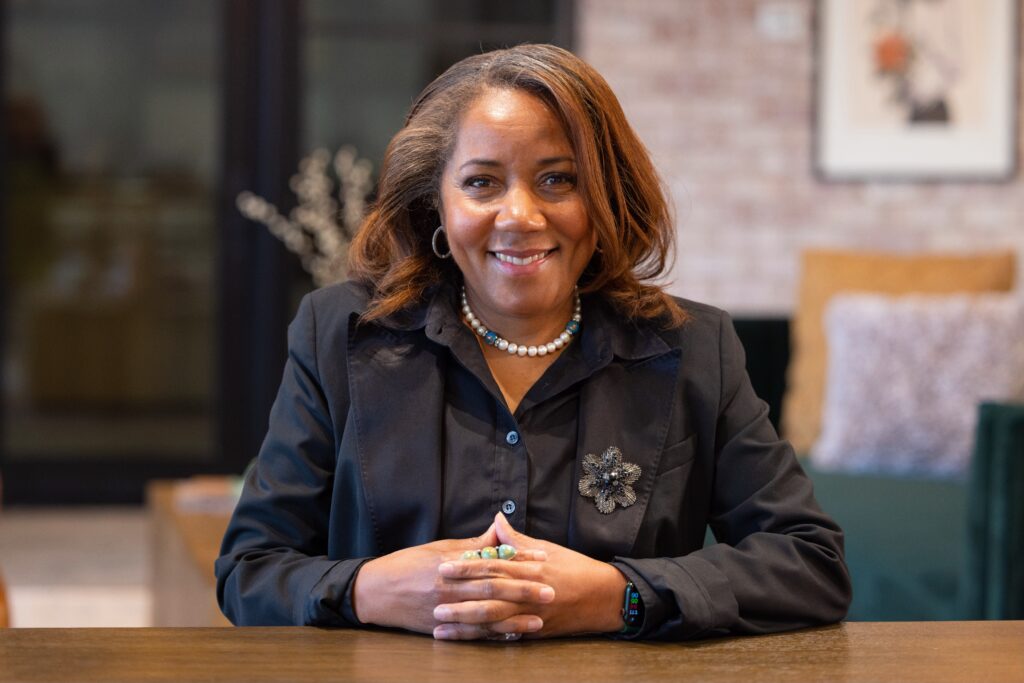Interview: VP Of Inclusion At Apple Says Everyone Needs To Hold Each Other Accountable When It Comes To Diversity

Apple hired Intel’s chief diversity and inclusion officer, Barbara Whye, back in 2021. Whye, who has years of experience and made it on Fortune’s list of Most Powerful, spent 25 years at Intel, helping the company make more meaningful and durable positive change.
But she decided to take a leap and move on and work for tech giant Apple.
In June, following the killing of George Floyd by a police officer, Apple CEO Tim Cook announced a $100 million racial justice initiative.
Other tech executives have also spoken out against racial violence and in support of increasing racial representation across their ranks.
Just earlier this week we reported that The Propel Center, the global HBCU technology and learning hub intended to level the playing field and open greater doors of opportunity for HBCU students, announced the launch of its Propel Student Impact Scholarships, with support from Apple and Southern Company.
According to recent reports on its diversity website, 24% of the company’s U.S employee base in 2018 was composed of “underrepresented minorities. But in that same year, 53% of new U.S. hires were from underrepresented groups.
So it’s clear that the company – on first look – is dedicated to making a robust change when it comes to diversity but what does its VP of diversity and inclusion have to say?
We spoke to Whye about her journey to Apple, the importance of her role, and of course whether the tech industry is doing enough.
What are three words to describe you?
I am: visionary, optimistic, and a problem-solver.
Can you tell us what you do at Apple?
As vice president of Inclusion & Diversity at Apple, I lead the company’s commitment to building a more equitable workforce and inclusive world by increasing diverse representation at every level, fostering an inclusive culture that brings everybody in, and ensuring equitable pay and access to opportunity for all. As a company, our goal is to ensure that representation, inclusion, and accountability are at the core of all lines of business within Apple — from recruiting and hiring to growth and development. Together, we’re working every day to create an environment for people to do their best work.

How did you start there / How did you get into tech? Is this something you’ve always wanted to do?
I studied electrical engineering at the University of South Carolina (go Gamecocks!) and started my career as an engineer. I joined Apple in 2021 after more than 25 years of experience as an engineer, philanthropic leader, and senior executive in the technology sector. Even early in my career, I would look at the world through a lens of equity and access. It started with a desire to solve problems and make things better. I’ve always been drawn to finding creative solutions to any challenges I face, so it was a natural progression to find myself in my role today where I am focused on identifying and creating solutions to accelerate workplace inclusion and diversity strategies, specifically in tech.
What is the most rewarding aspect when it comes to working for Apple?
The people! The people are the heart of this company. Working alongside team members where we focus every day on creating the best products and services to enrich peoples’ lives, is one of the most rewarding parts of working at Apple. The people here are the core of our company; their voices help shape our practices, ideas, and innovation and it’s an incredible experience to be in a role where I am able to amplify voices and take actions that meet the needs of communities every day, such as growing our employee-led Diversity Network Association (DNA) communities and expanding our diversity outreach efforts at HBCUs through investing in the next generation.
When it comes to career progression, what kind of support did you find the most valuable?
Both sponsorship and mentorship have always been key for me. I’ve been fortunate to have some great mentors and sponsors who, at times, saw leadership traits in me that I didn’t see in myself. They helped nurture the best parts of me and inspired me to push myself to dream big. I also listen well and took action on the advice from both my mentors and sponsors. Having a trusted partner who can give you “real” feedback and challenge you in every dimension is helpful in your career growth trajectory. It’s not enough to hear the advice, you should also take action and keep learning and growing.
Let’s go all the way back to your studies. What got you interested in the industry?
I am one of eight children with a love for math. My parents and siblings deserve the credit for exposing me to and nurturing my interest in STEM. My mom was a seamstress and my dad a carpenter and all of my siblings chose STEM occupations. They encouraged me to try engineering and also do internships to determine which type of engineering would be the best match for me. I started out in chemical engineering and ultimately switched to electrical engineering after an awesome internship that involved building and testing disk drives.
I became an engineer in 1995 and spent 20 years in leadership and construction engineering roles around the world. I earned my bachelor’s degree in electrical engineering from the University of South Carolina and my MBA from the university’s Darla Moore School of Business.
What are some obstacles that girls, women, and others from underrepresented communities often need to overcome when entering the tech industry?
Even though I was fortunate to have great mentors and sponsors who supported me and challenged me to take on new opportunities and stretch assignments, I know there are so many people who continue to face obstacles, experience isolation, and lack sponsorship. And for some, barriers remain to get in the room, having a seat at the table, and staying in tech. Each one of us must continue to be involved in the design processes of making our work and world better. This may require us to reimagine and co-create new designs and new spaces. What I have learned over the years is to use my voice for good and I also know that it is ok to ask for help. Asking for help is a strength. Nurture your networks so that you have a solid cohort of support around you.
Are tech’s diversity and inclusion really improving at the pace it can or can more be done? We’ve made major strides, and there’s a lot in the works at Apple and across the industry. And we must keep doing the work to impact systems and create long-lasting change. This work is not a one-and-done. It requires all of us to own inclusion and take action to make things better. If everyone starts with themselves — holding ourselves accountable — we can create a culture where inclusion and equity are the norms.
Why is your role so important?
The role of the Inclusion & Diversity team at Apple is to work towards building an inclusive culture that supports innovation and ensures each employee is able to show up as their full selves in the workplace and be seen, heard, valued, and respected by their colleagues and company leaders. That’s what keeps us moving forward and allows us to create the best and most inclusive products for everyone. My role is important to elevate the work so many others do to build diversity, equity, and inclusion into our systems and processes.
Having a senior leader fully focused on inclusion and diversity — partnering with so many other leaders and team members across the company — helps to ensure we hold ourselves accountable to continuing to take action and make consistent progress as a company. Ultimately, inclusion, diversity, and equity work shouldn’t be an add-on to the work we do but instead be fully integrated into the way everyone gets work done, every day.
What skill is essential in such a senior role?
I think it’s critical to have a growth mindset. The world and the people in it are constantly changing, and it’s imperative for leaders to always keep learning, growing, and pushing themselves to stay at the forefront. I’m also an optimist; I look for the best in people and the world and try to bring that perspective to my work.
Advice to young women and other young people from underrepresented communities on how to navigate the tech sector and level up in their workplace?
For me, it always comes back to mentorship, sponsorship, and opportunity. Having a network of people who can share their experiences and insights while also uplifting you as you go on your own career journey is priceless. Also, stay inquisitive and practice self-care. We sometimes take care of everyone and everything except ourselves. “Self-care is giving the best of you and not what’s left of you.” Lastly, believe in yourself! You’ll thank yourself for that one.



